- Home
- Mario Puzo
Six Graves to Munich Page 5
Six Graves to Munich Read online
Page 5
During the night the truck stopped and other soldiers came into the back of it to lie on the blankets with her. She pretended to be asleep and let them, too, do as they wished. In the morning the truck continued on, then stopped in the heart of a great ruined city.
The air was sharper and colder. Rosalie recognized the dampness of the north, but though she had often read about Bremen in her schoolbooks she did not recognize this vast wasteland of bombed-out ruins as the famous merchant city.
The blond soldier helped her out of the truck and into a building whose lower floor was still intact. He took her into a huge dining room crammed with military gear and containing a black stove with a roaring fire. In the corner of the room was a bed with brown blankets. The blond soldier led her to the bed and told her to lie down on it. “My name is Roy,” he said. And then he lowered himself upon her.
Rosalie spent the next three weeks in that bed. Roy curtained it with blankets so that it became a small private chamber. There Rosalie received an endless procession of faceless men who pushed themselves inside her. She didn’t care. She was alive and warm. She was not cold beneath the rubble.
On the other side of the blanket curtain she could hear a great many male voices laughing; she could hear the shuffling of cards and the clink of bottles against glass. When one soldier left and another took his place, she always welcomed the new man with a smile and open arms. On one occasion a soldier peeped around the curtain and whistled with admiration when he saw her. She was already fully developed at fourteen, already a woman.
The soldiers treated her like a queen. They brought her heaped plates of food she had not tasted since before the war. The food seemed to stoke her body with unslakeable passion. She was a treasure of love, and they pampered her as they used her body. Once, the blond Roy who had picked her up in his truck said with concern, “Hey, baby, you wanta get some sleep? I’ll chase everybody out.” But she shook her head. For as long as her faceless lovers came through the curtain of blankets, she could believe it was all a dream—the hard flesh, her father’s checked legs sticking out of the rubble, the wedding-banded hand pointing toward the sky. It could never come true.
But one day some other soldiers came, pistols on their hips, white helmets on their heads. They made her dress, then took her down to a truck loaded with other young girls, some joking, some crying. Rosalie must have fainted in the truck, for the next thing she knew she was lying in a hospital bed. Very dimly and from far away she saw a doctor looking at her intently. He had on a white jacket, but beneath it was an American uniform.
Lying on the cool white bed she heard the doctor say, “So this is the babe who has everything. Pregnant, too. We’ll have to abort her. All that penicillin and fever killed the fetus. Such a beautiful kid, too.”
Rosalie laughed. She knew she was dreaming beside her garden patch outside Bublingshausen, waiting to walk home to her father and mother. Perhaps there would be a letter from her older brother who was fighting in the East against Russia. But her dream was taking so long to end. She was frightened now, the dream was too terrible. She began to cry, and finally she was truly awake. . . .
Two doctors stood beside her hospital bed; one German, one American. The American smiled. “So you’re back with us, young lady. That was close. Can you talk now?”
Rosalie nodded.
The American doctor said, “Do you know you put fifty American soldiers in the hospital with VD? You did more damage than a whole German regiment. Now—have you been with soldiers anywhere else?”
The German doctor leaned over to translate. Rosalie raised herself up on one arm, covers clutched modestly to her breast. She asked him gravely, “Then it’s not a dream?” She saw his bewildered look. She started to weep. “I want to go home to my mother,” she said. “I want to go home to Bublingshausen.”
Four days later she was committed to the insane asylum at Nordsee.
In the darkness of their Berlin hotel room, Rogan pulled her close to him. He understood now about her emotional blankness, her apparent lack of any moral values. “Are you all right now?” he asked.
“Yes,” she said. “Now I am.”
CHAPTER 7
Rogan drove the Mercedes to the Freislings’ gas station the next day and asked them to make some modifications on its body. Specifically he wanted the huge trunk in the rear to be made airtight. While the work was being done he became very chummy with the brothers, told them about his computer work and how his company was looking for an opportunity to sell their ideas to the countries behind the Iron Curtain. “Legally, of course, only legally,” Rogan said in a tone of voice that implied he was just saying it for the record but that he would welcome a profitable crooked deal.
The two brothers smiled slyly. They understood. They questioned him more closely about his work. They asked him if he would be interested in making a tourist visit to East Berlin in their company. Rogan was delighted. “Of course,” he said eagerly, and pressed them for a specific date. But they smiled and said, “Langsam, langsam. Slowly, slowly.”
Several times they had seen Rosalie with him, and they had drooled over her beauty. Once when Rogan had gone into the office to pay a bill, he had come out to find Eric Freisling, with his head inside the Mercedes, talking earnestly to Rosalie. As they drove away Rogan asked Rosalie, “What did he say to you?”
Rosalie answered impassively, “He wanted me to sleep with him and spy on you.”
Rogan didn’t say anything. As he parked in front of the hotel Rosalie asked, “Which brother was it that talked to me? What is his name?”
“Eric,” Rogan said.
Rosalie smiled at him sweetly. “When you kill them let me help you kill Eric.”
The next day Rogan was busy making his own personal modifications on the Mercedes. He spent the rest of the week driving around Berlin and thinking out his plans. How would he make the Freisling brothers give him the names of the last three men? One day he went past the huge parking area of Berlin’s main railway station. Thousands of cars were parked there. Rogan grinned. A perfect cemetery.
To build an image of being a big spender who had crude tastes—which in turn might suggest a moral corruptness—Rogan took Rosalie to the more expensive and disreputable nightclubs, night after night. He knew that the Freisling brothers, perhaps even the East German counterintelligence apparatus, would be checking him out.
When the Freislings arranged an East Berlin tourist visa for him and Rosalie, he expected the contact to be made then. He had in his pocket a sheaf of computer blueprints for sale. But no contact was made. They saw the concrete Headquarters Bunker in which Hitler had died. The Russians had tried to blow it up, but the concrete walls were so thick, so solid with cement and steel, that it had proved impossible to destroy. So this historic bomb shelter, which had witnessed the suicide of the most feared madman of all time, was now a grassy mound in the middle of a children’s playground.
Strolling farther on through the Hansa quarter bristling with huge, gray, avant-garde apartment buildings, they were repelled by one of the new architectural gimmicks in the building complex. All its pipes for garbage, toilet waste, water, ended exposed in a huge glass terminal building, so that they looked like a nest of malignant steel snakes. Rosalie shuddered. “Let’s go home,” she said. She did not like the new world any better than the old.
Back in West Berlin they hurried to their hotel. Rogan unlocked the door to their suite and opened it for Rosalie, patting her round bottom as she went by. He followed her inside and heard her surprised gasp as he closed the door. He wheeled around.
They were waiting for him. The two Freisling brothers sat behind the coffee table, smoking cigarettes. It was Hans who spoke. “Herr Rogan, do not be alarmed. You understand that in our business one has to be careful. We did not wish anyone to know we had contacted you.”
Rogan went forward to shake their hands. He smiled reassuringly. “I understand,” he said. He understood more. That they had come early
to search his room. To find out if he was a plant. To perhaps find and steal the blueprints so they would not have to pay cash for them—
Communist cash they could then put in their own pockets. But they had been out of luck and forced to wait. The blueprints were in his jacket pocket. More important, the seven envelopes, plus the gun and silencer, were in a small bag that he had checked into the hotel storage cellar.
Hans Freisling smiled. The last time he had smiled like that, his brother Eric had crept up behind Rogan to fire the bullet in his skull. “We wish to purchase some of your computer blueprints, in strict confidence of course. Are you agreeable?”
Rogan smiled back. “Have supper with me here tomorrow evening,” he said. “You understand I have to make some arrangements. I do not keep everything I need in this room.”
Eric Freisling smiled slyly and said, “We understand.” He wanted Rogan to know that they had searched the suite; he wanted him to know that they were not men to be trifled with.
Rogan looked at him steadily. “Come tomorrow evening at eight,” he said. He ushered them out of the room.
That night he could not respond to Rosalie, and when she finally fell asleep, Rogan lit a cigarette and waited for the familiar nightmare to come. He was on his third cigarette when it started.
And then in his mind a dark curtain was drawn aside and he was in the high-domed room of the Munich Palace of Justice. Far away in the limitless shadows of his brain seven men took their eternal shapes. Five of them were blurred; but two—Eric and Hans Freisling—were very clear, very distinct, as if they were standing in a spotlight. Eric’s face was as he had looked into it that fatal day, the slack heavy mouth, the sly, snapping black eyes, the thick nose, and stamped over all the features, a brutish cruelty.
The face of Hans Freisling was similar to Eric’s, but with cunning rather than cruelty in the expression. It was Hans who advanced on the young prisoner Rogan and encouraged him with false kindliness. It was Hans who looked directly into Rogan’s eyes and reassured him. “Dress in those nice clothes,” Hans had whispered. “We are going to set you free. The Americans are winning the war and some day you can help us. Remember how we spared your life. Change your clothes now. Quickly.”
And then, trustfully, Rogan changed his clothing; gratefully he smiled at the seven murderers of his wife. When Hans Freisling put out his hand in friendship, the young prisoner Rogan reached out to grasp it. Only then did the faces of the five other men become clear with their furtive, guilty grins. And he thought: Where is the seventh man? And at that moment the brim of his new hat tilted forward over his eyes. He felt the cold metal of the gun barrel against the back of his neck. He felt his hair bristle with terror. And just before the bullet exploded in his skull he heard his cry for mercy, the long shrieking “Ahhhhhhhh.” And the last thing he saw was Hans Freisling’s sly smile of delight.
He must have cried out loud. Rosalie was awake. His whole body was shaking, absolutely out of control. Rosalie got up out of bed, and using a smooth cloth towel, she wiped his face with cooling alcohol. Then she bathed his whole body with it. Next, she ran the tub full of hot water and made him sit in the steaming bath. She sat on its marble rim as he soaked. Rogan could feel his body stop shaking, the pounding of blood against the metal plate in his skull easing off.
“Where did you learn all this?” he asked her.
Rosalie smiled. “The last three years in the asylum I was used as a nursing aide. I was almost well then. But it took me three years to get up enough courage to run away.”
Rogan took her cigarette and puffed on it. “Why didn’t they release you?”
She smiled down on him sadly. “They had no one to release me to,” she said. “I have no one in the world.” She paused for a long moment. “Except you.”
The following day was a very busy one for Rogan. He gave Rosalie five hundred dollars’ worth of marks and sent her out shopping. Then he went out to do some necessary chores. Making sure he was not followed, he drove to the outskirts of Berlin and parked the Mercedes. He went into a pharmacy and bought a small funnel and some chemicals. At a hardware store he bought wires, a small glass mixing bowl, nails, tape, and a few tools. He drove the Mercedes to a deserted side street, its ruins not yet rebuilt, and worked on the interior of the car for almost three hours. He disconnected all the wiring that operated the rear brake lights, and ran other wires into the car trunk. He bored holes into the airtight trunk, and then put tiny hollow rubber tubing into the holes. He mixed the chemicals, then put them in the small funnel and placed it over the piece of hollow tubing that now came up from the floor to the steering wheel. It was all very ingenious, and Rogan hoped it would work. He shrugged. If it didn’t, he’d have to use the pistol and its silencer again. And that could be dangerous. It would hook him up with the other killings when the police compared ballistic tests. Rogan shrugged again. The hell with it, he thought. By the time they got all the evidence together his mission would be completed.
He drove back to the hotel and parked in the special area reserved for guests. Before he went up to his room he drew his suitcase from the storage cellar. Rosalie was already waiting in their suite. It hadn’t taken her long to spend the money. She modeled the seductive Paris gown she had bought, which scarcely covered her breasts. “If that doesn’t distract those two bastards nothing will,” Rogan said, with an exaggerated leer. “Now are you sure you know what you have to do tonight?”
Rosalie nodded, but he briefed her again, slowly and thoroughly. “Do you think they will tell you what you want to know?” Rosalie asked.
“I think so,” Rogan said with a grim smile. “One way or the other.” He picked up the telephone and ordered dinner for four to be sent up to the room at eight o’clock.
The Freisling brothers were punctual; they arrived with the food trolley. Rogan dismissed the waiter, and as they ate they discussed the terms of their deal. When they had finished eating he poured four glasses of Pfefferminz liqueur, half brandy, half peppermint. “Ah, my favorite drink,” Hans Freisling said. Rogan smiled. He had remembered the smell of peppermint in the interrogation room, the bottle Hans had carried around with him.
When Rogan capped the bottle he dropped in the drug pellets. He did it quickly and expertly; the brothers were not aware of what he was doing, though they were looking directly at him. With their natural suspiciousness, they were waiting for him to drink first. “Prosit,” Rogan said, and drank. The sweet liqueur almost made him sick. The two brothers drained their glasses, and Hans licked his thick lips greedily. Rogan passed him the bottle. “Help yourself,” he said. “I must go and get the documents. Allow me.” He went past them into the bedroom. As he did so he saw Hans fill his glass and drain it. Eric was not drinking. But then Rosalie leaned over, her creamy breasts showing. She filled Eric’s glass for him and let her hand fall on his knee. Eric lifted the glass and drank, his eyes on Rosalie’s breasts. Rogan closed the door of the bedroom behind him.
He opened the suitcase and took out the Walther pistol and its silencer. Quickly he fitted them together. Then holding the gun in plain view, he opened the door and walked back into the other room.
The drug in the liqueur was a slow-acting one, not a knockout drug. It was designed to cripple the victim’s reflexes so that he would move and react very slowly. It was similar to the effect that too much alcohol has on a man’s physical coordination, throwing it out of balance, yet leaving him the illusion that he is performing better than ever. So the Freisling brothers were not yet aware of what was happening to their bodies. When they saw the gun in Rogan’s hands they both jumped up from their seats, but they moved in slow motion.
Rogan pushed them back onto their chairs. He sat down opposite them. From his jacket pocket he took a flattened bullet, tarnished with age, and threw it on the coffee table between them.
“You, Eric,” Rogan said. “You fired that bullet into the back of my skull ten years ago. In the Munich Palace of Justice. Do you remem
ber me now? I’m the little play-mate you sneaked up on while I was changing my clothes—and while your brother Hans kept telling me that I was going to be freed. I’ve changed a lot. Your bullet changed the shape of my head. But look hard. Do you recognize me now?” He paused, then said grimly, “I’ve come back to finish our little game together.”
Mentally dulled by the drug, they both wore looks of blank incomprehension and stared at Rogan. It was Hans who first showed recognition, whose face first showed the natural shock, fear, and terrified surprise. Then they tried to flee, moving like men underwater. Rogan reached over and again gently pushed them back in their seats. He frisked them for weapons. They had none.
“Don’t be afraid,” Rogan said, deliberately imitating Hans’ voice. “I’m not going to harm you.” He paused. “Of course I’ll turn you in to the authorities, but all I want from you now is a little information. As a long time ago you wanted some from me. I cooperated then, didn’t I? I know you’ll be just as intelligent.”
Hans answered first, his voice thick with the drug but still sly. “Of course we’ll cooperate; we’ll tell you anything we know.”
“But first we’ll make a bargain,” Eric growled sullenly.
As long as they kept sitting still the brothers seemed to function normally. Now Hans leaned forward and said with ingratiating friendliness, “Yes. What do you wish to know, and what will you do for us if we cooperate?”
Rogan said quietly, “I want to know the names of the other men who were with you in the Munich Palace of Justice. I want to know the name of the torturer who killed my wife.”
Eric leaned over, parallel to his brother, and said slowly, contemptuously, “So you can kill us all like you killed Moltke and Pfann?”
“I killed them because they would not give me the other three names,” Rogan said. “I offered them a chance to live as I now give you a chance to live.” He signaled now to Rosalie. She brought over pads and pencils and handed them to the brothers.

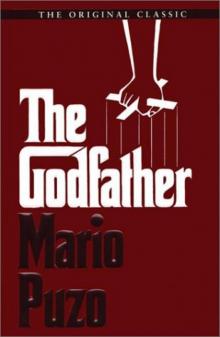 The Godfather
The Godfather The Dark Arena
The Dark Arena The Family
The Family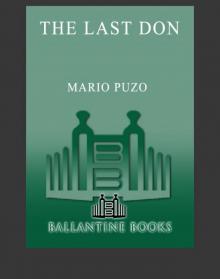 Last Don
Last Don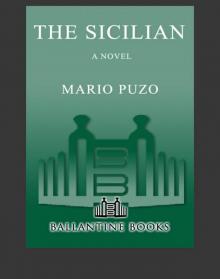 The Sicilian
The Sicilian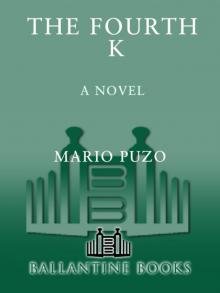 The Fourth K
The Fourth K Omerta
Omerta Six Graves to Munich
Six Graves to Munich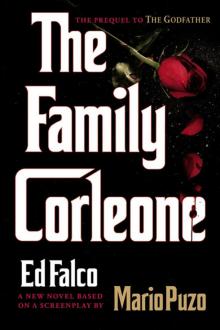 The Family Corleone
The Family Corleone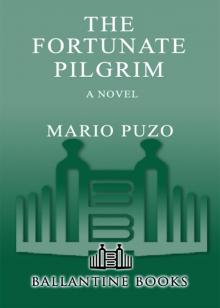 The Fortunate Pilgrim
The Fortunate Pilgrim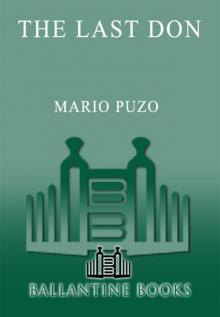 The Last Don
The Last Don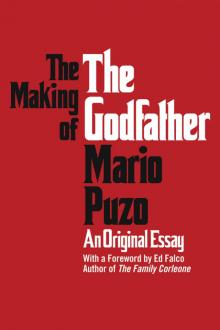 The Making of the Godfather
The Making of the Godfather Fools die
Fools die The Sicilian (v2.0)
The Sicilian (v2.0)